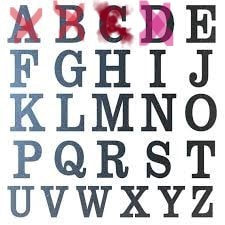 How many times have you said, “I feel so discombobulated?” Or, noted how a situation felt discombobulated? I have often used that word when I’ve felt out of sorts or life situations have gone awry. Recently, I discovered the word recombobulate. Yes, it is a real word. The dictionary definition states “to think clearly again; to reorient oneself; to get (oneself) back into working order. “ Words are so much fun. There are gazillions of words that have been around for centuries and new ones that are always being created. Recombobulate has now been added to my collection of fun, interesting words to use whenever possible. What words do you particularly enjoy using?
0 Comments
 Recently I was noticing some of the quirky things I do. Others would likely call them oddities. I suppose they are. We all have our own particular quirks, oddities, traits. They are simply part of what makes us, us. Why not embrace them, enjoy them in ourselves and in others? “All the quirks you've spent years trying to hide, they are actually your superpowers; they're what set you apart. They don't make you better. They don't make you worse. They make you you, and only you can be that.” Oliver Stark  Play is a vital and important part of our lives. It’s good to do and good for you! That probably explains why play is universal across all human societies. It helps us develop when we are children but remains essential in keeping us strong, agile, mentally healthy, and vibrant as adults. At The Strong National Museum of Play we celebrate the importance of play and publish the latest scholarly research on the subject through our peer-reviewed publication the American Journal of Play. Based on that research here are ten reasons why you should make play a part of your everyday life. 1. Play Strengthens You 2. Play Makes You Smarter 3. Play Helps You Solve Problems 4. Play Boosts Creativity 5. Play Reduces Stress 6. Play Helps You Make Friends 7. Play Enhances Attractiveness 8. Play Builds Resilience 9. Play Promotes Discovery 10. Play is Fun”  he Oxford Languages Dictionary defines opportunity as “a set of circumstances that makes it possible to do something.” A few synonyms include chance, time, moment, possibility. Opportunities can be taken, seized, ignored, passed up, gone unnoticed, succeeded, failed, and so on. What role have opportunities played in your life? How have you been able to spot an opportunity and taken advantage of it? Have you ever found an opportunity that came out of a difficult situation? Have you ever wished for an opportunity that did not seem to be in the picture? Have you ever passed on an opportunity and regretted it later? Have you ever created an opportunity for yourself? “Every day is a new opportunity. You can build on yesterday's success or put its failures behind and start over again. That's the way life is, with a new game every day.” Bob Feller  What are the things we notice and pay attention to throughout our day? How much of what we pay attention to is positive or negative? How do those things affect our mood and demeanor? Noticing and paying attention in the moment are components of mindfulness which affect our well being. Harvard University professor Ellen Langer, who has studied mindfulness for over 35 years, suggests that being mindful is as simple as noticing new things. She says that when we notice new things. we become engaged which keeps us in the present. It can open us to new perspectives. Noticing new things can help make us more aware of the “glimmers” and good things throughout our day. Greater awareness of those good things can also lead to gratitude which in itself increases well being. Here’s to discovering new things and many glimmers.  While I was growing up, I had the notion that miracles were only those rare, major occurrences like were in the Bible or unexplained healings, etc. Over the years, I have become aware that miracles happen all around us, if we just take a moment to notice. All that happens in nature, someone showing up when most needed while least expected, making a full recovery when recovery was impossible, when animals of different species known to be hostile bond, are just a few instances. Jon Bon Jovi sums it up perfectly: “Miracles happen everyday, change your perception of what a miracle is and you’ll see them all around you.”  Notables such as Gretchen Rubin (The Happiness Project), Tal Ben Shahar (Happier), Martin Seligman (Flourish), Marcy Shimoff (Happy For No Reason), et al have all indicated in their studies on happiness that it is the little things that lead to more lasting happiness than the big things. While that truth applies to any societal condition, it may be even more meaningful during this current difficult and stressful time. I believe we are all looking for some little joys to lift our spirits. What are some little things that may happen throughout the day that bring about a smile? Perhaps there might be some micro moments of positive connection that occurs with someone rather unexpected like meeting up with a friend we haven’t seen in awhile or having someone give us a seat on the subway or bus, or just a passing smile? What are some good things that might happen during the day no matter how small? When we question if there were any good things in a day, there are often memories of special moments that occurred in our past that can lift our spirits. I know for myself, there are some special memories of my childhood or times with my grandchildren that trigger those feelings of joy. I wish you many moments of sparkles, and little joys throughout your days.  The Mayo Clinic explains how the Art of Kindness can positively affect every aspect of our being: “Rather than viewing it exclusively as an action, think of kindness as a quality of being you can cultivate. Giving kindness often is simple, free and health-enhancing. Good for the body Kindness has been shown to increase self-esteem, empathy and compassion, and improve mood. It can decrease blood pressure and cortisol, a hormone directly correlated with stress levels. People who give of themselves in a balanced way also tend to be healthier and live longer. Kindness can increase your sense of connectivity with others, decrease loneliness, combat low mood and improve relationships. It also can be contagious, encouraging others to join in with their own generous deeds. Looking for ways to show kindness can give you something to focus on, especially if you are anxious or stressed in certain social situations. Good for the mind Physiologically, kindness can positively change your brain by boosting levels of serotonin and dopamine. These neurotransmitters produce feelings of satisfaction and well-being, and cause the pleasure and reward centers in your brain to light up. Endorphins, your body's natural painkiller, also may be released when you show kindness. Be kind to yourself When sharing kindness, it's not just how you treat other people — it's also about how you extend those same behaviors and intentions to yourself.”  It may seem joy and happiness are interchangeable, they are not. Happiness is a choice. It can come and go. Joy lives in our hearts and is always available. Certainly, there are many things in our lives that bring us joy, yet true joy comes from deep within. Joy can be a source of happiness. Here are some aspects about joy.
 Imagination is a unique word and carries the world in it. It is a common belief that seeing imaginary ( not-real ) things is imagination. Not always so. We can develop not just images but ideas and plans that will further help in completing tasks, achieving our goals. Creativity is woven deep within our imaginative powers. Our ability to create, build or construct things depends on the strength of our imagination. The vision of a dress comes before sketching the blueprint. The concept of a plot, characters, and lessons come before writing a story. The ideation of the steps and consequences comes before developing the prototype of a machine or device. Considering pros and cons comes before realizing solutions. Envisioning a picture comes before painting a canvas. Imagining is like a seed that sprouts, then begins to grow,, blossom and finally blooms. “Imagination is more important than knowledge. Knowledge is limited. Imagination encircles the world.” Albert Einstein  Martin Luther said several centuries ago, Everything that is done in this world is done by hope.” There is much turmoil and uncertainty on so many levels in the world these days. Still there is hope because there are those doing whatever they can to bring goodness and restore stability. We have choices. We always have choices. Even when we stand immobile and do nothing, that is a choice. Is that what we want, succumbing to our challenges, not making waves, believing there is nothing we can do? However, when we choose hope, there are no limits to possibility. I found that the following by Dave Hood said it best: “Hope is not wishful thinking, nor is it magical thinking. Hope is an emotion, a mindset, a belief, a motivation, that despite setbacks and obstacles, despite hardship and misfortune, despite the unknown last chapter of your life’s story, you believe that your life will work out, that when you take your last breath, there is something else beyond this world. You can do incredible things when you have enough hope.” Maybe, just maybe, the message entering the unknown of what lies before us is, whatever we are faced with, our default needs to be hope.  Gosh, oh gee. I never would have guessed what happened when I tried to select a g word. Each time I came up with a possibility, a glut of other words galloped through my mind. It was as if someone turned on a faucet labeled g and a galore of words gushed forth. I tried to turn off the faucet and just go with one word. However, gleefully, almost mockingly, g words continued to gush. What was I to do with this grandiose gathering of g’s? I couldn’t seem to zone in on one specific word. Finally, I decided not to fight it. Why, then, select the word, gift? Well, there are 358 positive words beginning with g. For example there is gentle, generosity, gratitude, grace, gleeful, gusto, giving. Any one of the 358 that resonate for me or you is a gift.  There are so many positive words that begin with ‘f’, despite what might come to mind at first. Some of those more pleasant words might be fun, faith, fanciful, friend, fact, fruitful, flexible, fastidious, to cite a very few. My question now is, did you ever latch onto a word because the sound of it invokes a good feeling? Felicity is that word for me. The sound of the word, the flow of the syllables always make me smile. And, of course, the meaning of this word is intense happiness. Some synonyms include, happiness, joy, joyfulness, cheerfulness, delight. Do you have any words that give you a good feeling when you hear or say them?  Sometimes less is more. This is one of those times. Maya Angelou’s words about empathy say it more succinctly and better than I could. “Each one of us has lived through some devastation, some loneliness, some weather superstorm or spiritual superstorm, when we look at each other we must say, I understand. I understand how you feel because I have been there myself. We must support each other and empathize with each other because each of us is more alike than we are unalike.”  “You’ve got to have a dream. If you don’t have a dream, how you gonna have a dream come true?” That’s a line from the song Happy Talk in the musical South Pacific. Just in case you relate the word ‘dream’ to wishful thinking or fantasy, let’s look at the synonyms for ‘dream’ found in the Oxford English Dictionary. They include Aspiration, goal, hope, intention, objective, design, ambition, plan, aim, vision. Having a dream, goal, aspiration, intention for our life in the short term and long term provides us with many benefits. It is a good way to focus attention on the things that are important. It allows us to create a vision of how we would like our life to be. This in turn has us develop a plan and set priorities . Even taking small steps towards that dream gives us hope, a sense of purpose and well being. Dream on. |
Archives
July 2024
Categories
All
|

 RSS Feed
RSS Feed
